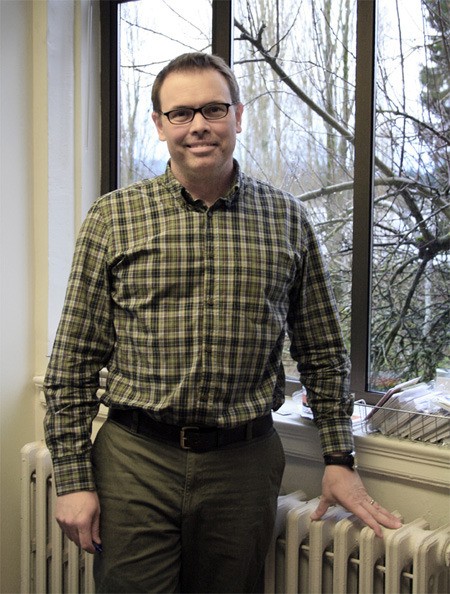Derek Franklin reaches out to the Mercer Island community as the administrative and professional services manager and project director at Mercer Island Youth and Family Services.
Where are you from? I came from the Bay area in the late ’80s. I grew up in Berkeley and came here after undergraduate school.
Tell me about your education. I did my undergraduate degree in psychology. I’m a graduate of Antioch University in marriage and family counseling.
How did you get into this line of work? Right out of school, my first job was doing group care with youth. Then I went into out-patient youth and family counseling in Burien while doing graduate work. I did that for many years before coming here and focusing on couples and marriage counseling. Communities That Care became my project three years ago.
What does Communities that Care do? It’s community-based drug and alcohol prevention, focused on changing policy, norms and the community environment on the Island.
Is there a drug and alcohol problem on the Island? Yes. It’s really clear that any drugs or alcohol are not a good thing. By senior year, Island kids have consumed more alcohol and marijuana than the state average. Tenth grade and younger, they are below the state average.
Is that because the kids have more money here? It’s about access. A lot of the alcohol is purchased by legal-age adults. There’s a huge misconception; 80 percent of kids at MIHS have not used marijuana, but 85 percent (of the kids) perceive everyone does it. There is a problem here, but it’s believed to be larger than it is, and that’s part of the problem.
What other programs fall under your management? The emergency assistance program, the food pantry, emergency financial services, employment services and youth development.
What does emergency financial services do? It provides short-term financial assistance. There’s sort of a hidden population of low-income residents on the Island. At 70 percent or below of state median income, they qualify for emergency financial assistance. We’re seeing Islanders who are now qualifying for services from us who didn’t qualify before. We help them work through the stigma and emotions — and many don’t know how to ask for help or how to piece together the solution. We can help up to $600 a year per client with rent.
What does an average day look like for you? I have a 4-year-old and a 1 1/2-year-old, so after I change diapers, I check with clinical supervisors about wait lists, meeting with CTC folks, check the finances within the city — we’re all on a shoe string. A lot of what I do is coordinate with other sources; for example, the state on how to help a client get unemployment. A lot of folks don’t know what they qualify for. For many it’s a ‘new normal.’
Where does MIYFS get its money? We raise about 85 percent of our own funds. About half of our revenue comes from the thrift store. A lot of our thinking is about sustaining the department. We are city staff with a nonprofit board. In exchange for that, as a city department, that’s why we only see people from Mercer Island. This is the only youth and family service in King County that partners with a city. It’s unique because we have a sliding scale for adults (most YFS organizations only have a sliding scale for children).
Were you pleased with the outcome of the “Giving From the Heart” breakfast/fundraiser? I was thrilled! There’s a lot of behind-the-scenes work to pull off. The look was new, and attendance was up by 100 people. The retail portion (where participating businesses donated 25 percent of their profit that day to MIYFS) brought in about $4,000, and most locations saw increased business. We’re still counting the money on the rest. We’re proud of the event. Folks can meet and chat — we’re very pro-community.



